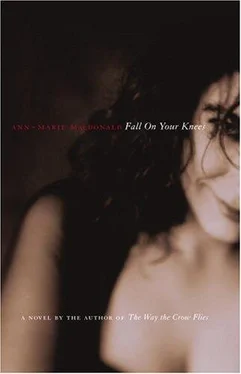Lily doesn’t flinch when she meets the man with no face, just a blank stretch of baby skin with nose holes and a lipless mouth that doesn’t quite close. He doesn’t mask his missing face because he never goes out and everyone on the ward is used to him; what’s more, he can’t frighten himself, he has no eyes. His great pleasure is a cigarette and, now, touching Lily’s face. He has found the bump in her forehead and it amuses him. He swears he was uglier before and shows Lily a picture to prove it. Lily agrees that he was putrid-looking and he laughs. Mercedes notes this as worthy of inclusion in The Life of Saint Lily, for Mercedes has never known this man to do more than grunt an obscenity, much less laugh.
Lily is not repelled by the veterans. She feels badly for them, they’ve been terribly hurt, but pity is a poison unction. Lily has experienced pity but she didn’t know what to call it, she only knew it made her terribly afraid. As if she had disappeared and become a ghost. Having experienced her own disappearance, she is conscious of how important it is for people to be seen, so when she looks at them — even the blind one — she also looks for them, just in case they too have got lost and need finding.
They play gin rummy until she learns poker. The gas men are the only ones who never laugh, though they enjoy themselves.
On the way home, when Mercedes quizzes her, Lily always feels she has somehow let her sister down when she answers truthfully, “I had fun.”
Every evening, when the day’s ministrations are done, Mercedes indulges herself with a gloriously blank sheet of paper: “Dear Ralph….”
There are things Lily could tell Mercedes that would have quite another effect, but it never occurs to her to do so. For example, Mr MacIsaac has stopped drinking. He tells Lily she has healed him. He tells her she has “the gift”. It happened one day when Lily asked to see where he grew the medicine. Mr MacIsaac took her back to his greenhouse.
Mr MacIsaac is also a veteran, though of the Boer War. It too was a bad war. He has said there’s no such thing as a good one. He and Lily both limp on the same side and he likes to tell her they’d run one heck of a three-legged race together. He tells her how like she is to her beautiful sister Kathleen, “God rest her soul.” Especially now that the red is coming out in her hair. “Faery hair” Mr MacIsaac calls it, a twinkle in his kind bleary eye. “Don’t worry, lass, that’s a good thing.”
They went through a canvas door into the greenhouse. The air was mysterious to breathe, damp like an underground lake. There were plants in boxes everywhere, each with a special power but none, it seemed, that could cure him.
But the miraculous thing was overhead. Lily looked up at the glass roof. The sun came out from behind a cloud and filtered through the tiny panes. Before her eyes a host took shape. Shadows of green and grey, a ghostly army in uniform, smiling down at her. For ever young.
Glass photographic plates. Mr MacIsaac collected them — so many were discarded after the war, there being no demand for additional prints of such photos once their subjects had been killed.
“They’re my children,” he said. “We were never blessed with our own, so I think about all the people who lost theirs and how maybe I’d have lost mine too anyhow, things being what they were.”
Mrs MacIsaac had died early that year and people expected Mister to follow soon at the rate he was going, constantly quietly soused.
Lily said, “I’ll be your child.”
He laughed his wheezy laugh, then covered up his face. He reached for her hand and placed it on his bald head. After a while he gave her back her hand and looked up again. He asked her to do something for him.
“Whenever you pass by my door, say a Hail Mary for me. Will you do that?”
Lily promised she would, and she did. Still does. She didn’t tell anyone because it seemed private. Soon people were saying it was a miracle that Mr MacIsaac had quit the bottle. Even though there was barely a soul in town who didn’t owe him money, there was no one who wouldn’t rather see him spry behind his counter.
MacIsaac would live long enough to extend credit right through the Great Depression, and die a rich man on paper.
Lily did not feel disloyal to Daddy when she told Mr MacIsaac she would be his child. Frances would say, “That’s because Daddy’s not your real father.” But Lily knows he is. Just as she knows that it is possible to love everyone the most. Even if she can’t help loving Frances most of all.
Jameel has been charging admission on show nights. He makes Boutros wear a fez. He has replaced the faded curtain with a beaded one. There are ashtrays. There are glasses. He ups the price of poison. He’s still paying Frances a nickel a night. In September he has the nerve to demand a cut of her earnings from her private customers. What he gets is a new deal.
“Look buddy, I’ve turned this dump into a cultural Mecca, so don’t you be talking to me about cutting you in, you’re cutting me in, pal, I’m in for fifty percent of the door or I walk and talk.”
“Fuck you.”
“Sixty.”
“Forty.”
“Auryvoir.”
He grabs her arm. “Forty-five.”
“Kiss my arse.”
“Fifty.”
“Gimme a light.”
He lights her cigarette. “All right. You’re in now, so if you foul up I’ll cut your throat just like I would a man’s.”
“Get me a decent piano in here.”
Boutrous neither confirms nor denies Jameel’s threat, he just counts out half the evening’s admissions and hands it over to Frances.
“Hey Boutros,” she says. “I didn’t know you could count, b’y.” She winks at him and heads for the back room to change out of her diaper and merry widow.
In a place like this it’s best to get a man’s status — the threat of throat-cutting and only throat-cutting simplifies a woman’s survival. Frances trades in her coins and two-dollar bills for larger notes at the bank in order to fit it all into her hiding-place.
When the sweetheart of Whitney Pier turns seventeen there’s a cake and presents and everything. The clientele, which has grown more checkered along with Frances’s reputation, sings “Happy Birthday”. A woman whom Frances calls “The Countess” because she looks like the lesbian in Pandora’s Box gives her a one-way ticket to Boston. The Countess has got a big education and some kind of set-up down there — she’s described it to Frances a thousand times but Frances, though she keeps her eyeballs pointing in the same direction no matter how much she’s had to drink, still can’t get it straight whether this woman runs a nightclub or a home for wayward girls. “My intentions are entirely honourable, Fanny,” says the Countess, at which Frances yawns in her face and winks. A stoker named Henry gives Frances the latest Bessie Smith, “Black Mountain Blues”. She gives him a big sloppy kiss, then holds her hand out for a quarter, and everyone laughs. Archie “White-Socks” MacGillicuddy, who everybody knows is a sissy-boy, comes wearing his thing outside his pants gaily gift-wrapped with a bow and a tag, “For Frances”. Frances tells Boutros to open it for her, “Go on Buttress, good things come in small packages.” Boutros declines. Leo Taylor shows up at the front door in time to see Jameel parading through the crowd bearing a pint-size painted whore with a parasol on his shoulders. Taylor yells over the din, “Mr Jameel, I got what you ordered.”
Jameel sets Frances down and numerous hands cover her eyes before she can turn around, “Who toined out the lights?!” Boutros leaves with Taylor. After a few moments they return, veins bulging in their necks, inching a good-as-new upright piano through the door.
Читать дальше












